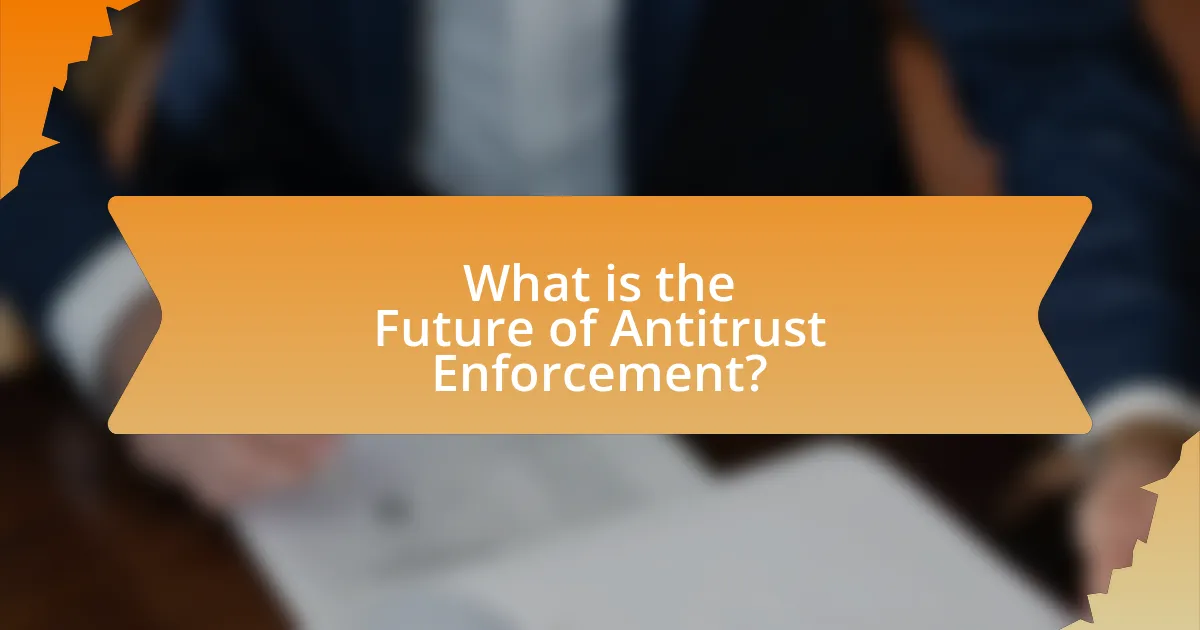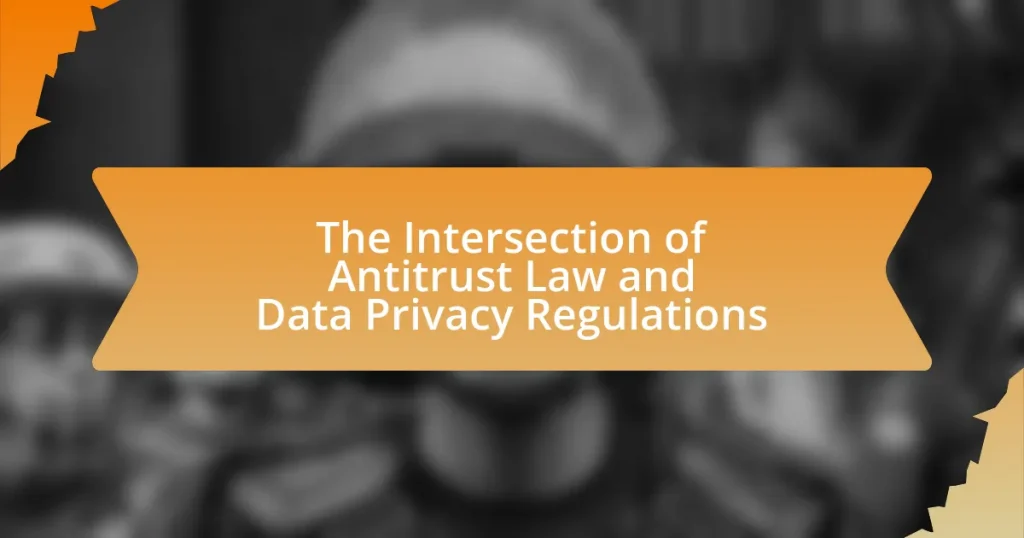The article focuses on the future of antitrust enforcement, highlighting the increasing scrutiny of large technology companies and the shift towards more aggressive regulatory measures globally. It discusses the evolving landscape of antitrust enforcement, driven by factors such as the rise of digital markets, market concentration, and changing economic theories. Key developments include the implementation of the Digital Markets Act in the European Union and a rise in antitrust lawsuits in the U.S. against major tech firms. The article also addresses the challenges faced by regulatory bodies, the impact of technological advancements on enforcement, and the importance of international cooperation in addressing anti-competitive practices.

What is the Future of Antitrust Enforcement?
The future of antitrust enforcement is likely to involve increased scrutiny of large technology companies and a shift towards more aggressive regulatory measures. Recent trends indicate that governments worldwide are prioritizing competition policy to address market dominance and anti-competitive practices, particularly in the digital economy. For instance, the European Union has implemented the Digital Markets Act, which aims to curb the power of major tech firms by imposing stricter rules on their operations. Additionally, the U.S. has seen a rise in antitrust lawsuits against companies like Google and Facebook, reflecting a growing commitment to enforcing competition laws. These developments suggest that antitrust enforcement will become more proactive and comprehensive, focusing on both traditional industries and emerging digital markets.
How is antitrust enforcement evolving in the current landscape?
Antitrust enforcement is evolving through increased scrutiny of big tech companies and a shift towards more aggressive regulatory approaches. Regulatory bodies, such as the Federal Trade Commission and the European Commission, are focusing on anti-competitive practices in digital markets, as evidenced by high-profile cases against companies like Google and Facebook. Additionally, recent legislative proposals aim to strengthen antitrust laws, reflecting a growing consensus that existing frameworks are inadequate to address modern monopolistic behaviors. This evolution is supported by a rise in bipartisan support for reform, indicating a significant shift in how antitrust issues are perceived and addressed in the current landscape.
What are the key factors driving changes in antitrust enforcement?
Key factors driving changes in antitrust enforcement include the rise of digital markets, increased market concentration, and evolving economic theories regarding competition. The digital economy has introduced new challenges, as traditional antitrust frameworks struggle to address issues like data monopolies and platform dominance. For instance, the U.S. Department of Justice and Federal Trade Commission have intensified scrutiny on major tech companies, reflecting concerns over their market power and anti-competitive practices. Additionally, the growing awareness of economic inequality has prompted regulators to consider broader impacts of monopolistic behavior, leading to a shift towards more aggressive enforcement strategies. Historical data shows that in 2021, the number of antitrust lawsuits filed in the U.S. reached its highest level in over a decade, indicating a significant shift in enforcement priorities.
How do technological advancements impact antitrust regulations?
Technological advancements significantly impact antitrust regulations by altering market dynamics and competition. Innovations such as artificial intelligence, big data, and digital platforms create new business models that can lead to monopolistic behaviors or anti-competitive practices. For instance, the rise of tech giants like Amazon and Google has prompted regulators to reassess traditional antitrust frameworks, which were primarily designed for industrial economies. The European Union’s General Data Protection Regulation (GDPR) and the U.S. Federal Trade Commission’s scrutiny of tech mergers illustrate how regulators are adapting to ensure fair competition in increasingly digital marketplaces. These adaptations reflect the need for updated legal standards that address the complexities introduced by technology, ensuring that antitrust laws remain effective in promoting competition and protecting consumers.
Why is the future of antitrust enforcement significant?
The future of antitrust enforcement is significant because it shapes market competition and consumer protection. As technology evolves and monopolistic practices become more sophisticated, effective antitrust enforcement is crucial to prevent market abuses that can stifle innovation and harm consumers. Historical examples, such as the breakup of AT&T in the 1980s, illustrate how proactive antitrust measures can restore competition and benefit consumers. Furthermore, recent legislative proposals and regulatory changes indicate a shift towards more aggressive enforcement, reflecting growing concerns about the power of large tech companies and their impact on the economy. This evolution in antitrust policy is essential for maintaining fair market dynamics and ensuring that consumers have access to diverse products and services.
What implications does antitrust enforcement have on market competition?
Antitrust enforcement has significant implications for market competition by promoting fairness and preventing monopolistic practices. When regulatory bodies enforce antitrust laws, they aim to dismantle anti-competitive behaviors such as price-fixing, market division, and abuse of market power, which can stifle competition and innovation. For instance, the U.S. Department of Justice’s successful case against Microsoft in the late 1990s demonstrated how antitrust action can lead to increased competition in the software market, ultimately benefiting consumers through lower prices and more choices. Thus, effective antitrust enforcement fosters a competitive environment that encourages new entrants and enhances consumer welfare.
How does antitrust enforcement affect consumer rights and protections?
Antitrust enforcement directly enhances consumer rights and protections by promoting competition and preventing monopolistic practices. When antitrust laws are effectively enforced, they ensure that consumers have access to a variety of products and services at fair prices, as competition drives innovation and quality. For instance, the Sherman Act of 1890 laid the groundwork for regulating anti-competitive behavior, leading to significant cases like United States v. Microsoft Corp., which demonstrated how enforcement can dismantle monopolistic control and restore market balance. This historical context illustrates that robust antitrust enforcement not only safeguards consumer interests but also fosters a healthier economic environment where consumer choice is prioritized.

What Predictions Can Be Made About Antitrust Enforcement?
Antitrust enforcement is expected to become more aggressive and comprehensive in the coming years. Regulatory bodies, particularly in the United States and the European Union, are increasingly focusing on large technology companies, as evidenced by recent high-profile cases against firms like Google and Facebook. The Biden administration has signaled a commitment to strengthening antitrust laws, which includes revisiting merger guidelines and enhancing scrutiny of anti-competitive practices. Additionally, public sentiment is shifting towards favoring stricter regulations to promote market competition, as seen in surveys indicating widespread support for antitrust action against monopolistic behavior. These trends suggest that antitrust enforcement will likely evolve to address emerging market dynamics and technological advancements more effectively.
How might regulatory approaches change in the coming years?
Regulatory approaches are likely to become more stringent and adaptive in the coming years, particularly in response to the evolving digital economy and increased market concentration. Governments and regulatory bodies are expected to implement more proactive measures, such as enhanced scrutiny of mergers and acquisitions, to prevent anti-competitive practices. For instance, the European Union has already introduced the Digital Markets Act, which aims to regulate large tech companies and ensure fair competition. Additionally, there is a growing trend towards international cooperation among regulators to address cross-border antitrust issues, as seen in recent collaborations between the U.S. and EU on technology regulation. These changes reflect a broader recognition of the need to balance innovation with consumer protection and market fairness.
What trends are emerging in antitrust policy formulation?
Emerging trends in antitrust policy formulation include a heightened focus on digital markets, increased scrutiny of mergers and acquisitions, and a shift towards considering broader economic impacts beyond consumer prices. Regulatory bodies, such as the Federal Trade Commission and the European Commission, are prioritizing the assessment of market dominance in technology sectors, reflecting concerns over data privacy and monopolistic practices. For instance, the U.S. Department of Justice has initiated lawsuits against major tech companies, signaling a more aggressive stance on enforcement. Additionally, there is a growing emphasis on the role of labor markets and the effects of corporate consolidation on wage stagnation, as seen in recent policy discussions and proposals aimed at protecting workers’ rights. These trends indicate a transformative approach to antitrust enforcement that seeks to adapt to contemporary economic realities.
How could international cooperation influence antitrust enforcement?
International cooperation could significantly enhance antitrust enforcement by enabling countries to share information, harmonize regulations, and coordinate investigations. This collaboration can lead to more effective detection of anti-competitive practices that cross borders, as evidenced by the European Union and the United States working together on cases like the Microsoft antitrust case, which highlighted the need for a unified approach to tackle global monopolistic behaviors. Furthermore, joint efforts can reduce the risk of regulatory arbitrage, where companies exploit differences in national laws to evade scrutiny, thereby fostering a more consistent and fair competitive landscape globally.
What role will technology play in future antitrust cases?
Technology will play a crucial role in future antitrust cases by enabling more efficient data analysis and enhancing the ability to detect anti-competitive practices. Advanced algorithms and machine learning tools will allow regulators to analyze vast amounts of market data, identifying patterns of behavior that suggest monopolistic or collusive actions. For instance, the use of big data analytics can help uncover pricing strategies and market dominance that may not be visible through traditional investigative methods. Additionally, technology will facilitate real-time monitoring of market activities, allowing for quicker responses to potential violations. The increasing reliance on digital platforms also means that antitrust authorities will need to adapt their frameworks to address issues like data privacy and algorithmic transparency, as seen in recent cases involving major tech companies.
How can data analytics enhance antitrust investigations?
Data analytics can enhance antitrust investigations by enabling the identification of anti-competitive behaviors through the analysis of large datasets. By employing advanced algorithms and machine learning techniques, investigators can detect patterns of price-fixing, market allocation, and other collusive behaviors that may not be evident through traditional investigative methods. For instance, the European Commission utilized data analytics in its investigation of Google, revealing anti-competitive practices in online advertising by analyzing vast amounts of search and advertising data. This approach not only increases the efficiency of investigations but also strengthens the evidence base, leading to more informed decisions and effective enforcement actions.
What challenges do digital markets pose for antitrust enforcement?
Digital markets pose significant challenges for antitrust enforcement due to their unique characteristics, such as network effects, data control, and rapid innovation. These features complicate the assessment of market power and anti-competitive behavior, as traditional metrics may not apply effectively. For instance, platforms like Google and Facebook benefit from network effects, where the value of their services increases with the number of users, making it difficult to determine when they have achieved monopolistic status. Additionally, the control of vast amounts of user data allows these companies to engage in practices that may stifle competition, yet are hard to quantify in terms of harm to consumers. Furthermore, the fast-paced nature of digital markets means that antitrust authorities may struggle to keep up with evolving business models and technologies, leading to delays in enforcement actions. These complexities highlight the need for updated regulatory frameworks that can address the nuances of digital competition effectively.

What Challenges Will Antitrust Enforcement Face?
Antitrust enforcement will face challenges such as the rapid evolution of technology, which complicates the assessment of market power and anti-competitive behavior. As digital platforms dominate markets, traditional antitrust frameworks struggle to address issues like data monopolies and network effects. For instance, the rise of big tech companies has led to increased scrutiny, yet existing laws may not adequately capture the nuances of digital competition. Additionally, global coordination poses a challenge, as differing regulatory approaches across countries can hinder effective enforcement. The complexity of mergers and acquisitions in tech industries further complicates the landscape, making it difficult to predict anti-competitive outcomes.
What obstacles hinder effective antitrust enforcement?
Obstacles that hinder effective antitrust enforcement include insufficient resources, complex legal frameworks, and political influences. Insufficient resources limit the ability of regulatory agencies to investigate and prosecute antitrust violations thoroughly. For example, the Federal Trade Commission (FTC) and the Department of Justice (DOJ) often face budget constraints that restrict their capacity to pursue cases against large corporations. Complex legal frameworks create challenges in proving anti-competitive behavior, as antitrust laws can be intricate and subject to varying interpretations. Additionally, political influences can affect enforcement priorities, as administrations may prioritize different economic policies that impact how aggressively antitrust laws are enforced. These factors collectively undermine the effectiveness of antitrust enforcement efforts.
How do political influences affect antitrust regulatory bodies?
Political influences significantly affect antitrust regulatory bodies by shaping their priorities, enforcement actions, and overall effectiveness. For instance, changes in administration can lead to shifts in antitrust policy, as seen when the Federal Trade Commission’s approach to mergers and acquisitions varies between Democratic and Republican leadership. Under Democratic administrations, there tends to be a stronger focus on consumer protection and addressing monopolistic practices, while Republican administrations may prioritize deregulation and business growth. This dynamic is evidenced by the increased scrutiny of large tech companies during the Biden administration, reflecting a political push for more aggressive antitrust enforcement. Additionally, lobbying efforts from powerful industries can sway regulatory decisions, impacting the enforcement of antitrust laws.
What are the limitations of current antitrust laws?
Current antitrust laws face several limitations, primarily due to their inability to effectively address modern market dynamics, particularly in digital economies. These laws often rely on outdated frameworks that do not account for the complexities of technology-driven monopolies, such as those seen in social media and online platforms. For instance, the Sherman Act, enacted in 1890, lacks provisions for assessing anti-competitive behavior in the context of data privacy and algorithmic manipulation, which are prevalent in today’s markets. Additionally, the burden of proof required to demonstrate anti-competitive practices is high, making it challenging for regulators to take action against large corporations that engage in subtle forms of market manipulation. Furthermore, current laws often focus on consumer harm in terms of price increases, neglecting other forms of harm such as reduced innovation and choice. These limitations hinder effective enforcement and adaptation to rapidly evolving economic landscapes.
How can enforcement agencies adapt to new market realities?
Enforcement agencies can adapt to new market realities by leveraging advanced data analytics and technology to enhance their investigative capabilities. This adaptation allows agencies to identify anti-competitive behaviors more effectively in rapidly evolving markets, such as digital platforms where traditional methods may fall short. For instance, the Federal Trade Commission (FTC) has increasingly utilized data-driven approaches to analyze market dynamics and consumer behavior, enabling more informed decision-making in antitrust cases. By embracing these technological advancements, enforcement agencies can remain relevant and effective in addressing contemporary challenges in competition law.
What strategies can be employed to strengthen antitrust enforcement?
To strengthen antitrust enforcement, regulatory agencies can enhance collaboration with international counterparts, improve data analytics capabilities, and increase transparency in enforcement actions. Enhanced collaboration allows for a unified approach to tackling anti-competitive practices that cross borders, as evidenced by the success of the International Competition Network in facilitating cooperation among antitrust authorities. Improved data analytics capabilities enable agencies to better identify anti-competitive behavior through advanced algorithms and machine learning, which can lead to more effective investigations. Increased transparency in enforcement actions fosters public trust and accountability, as seen in the European Union’s commitment to publishing detailed reports on antitrust cases, which helps deter potential violations.
How can agencies balance innovation and regulation?
Agencies can balance innovation and regulation by adopting a flexible regulatory framework that encourages technological advancement while ensuring compliance with legal standards. This approach allows agencies to create guidelines that adapt to emerging technologies, fostering an environment where innovation can thrive without compromising consumer protection or market fairness. For instance, the European Union’s General Data Protection Regulation (GDPR) exemplifies a regulatory framework that promotes innovation in data handling while enforcing strict privacy standards. By continuously engaging with stakeholders, including businesses and consumers, agencies can refine regulations to support innovation while maintaining oversight, thus achieving a balance that benefits both sectors.
What best practices can be adopted for future antitrust enforcement?
Future antitrust enforcement can adopt best practices such as enhancing data transparency, utilizing advanced economic analysis, and fostering international cooperation. Enhancing data transparency allows regulators to access and analyze market data effectively, which is crucial for identifying anti-competitive behavior. Advanced economic analysis, including the use of predictive modeling and machine learning, can provide deeper insights into market dynamics and consumer behavior, improving the accuracy of enforcement actions. Additionally, fostering international cooperation among regulatory bodies can streamline enforcement processes and address cross-border anti-competitive practices, as evidenced by the increasing number of global mergers that require coordinated scrutiny. These practices are supported by the need for adaptive regulatory frameworks that can respond to rapidly evolving market conditions.
How can collaboration between agencies improve enforcement outcomes?
Collaboration between agencies can significantly improve enforcement outcomes by enhancing information sharing and resource allocation. When agencies work together, they can pool their expertise and data, leading to more comprehensive investigations and a better understanding of complex antitrust issues. For instance, joint task forces can leverage the strengths of different agencies, such as the Federal Trade Commission and the Department of Justice, to tackle monopolistic practices more effectively. Historical examples, such as the coordinated efforts during the Microsoft antitrust case, demonstrate that collaboration can lead to more robust legal actions and ultimately deter anti-competitive behavior.
What role does public awareness play in effective antitrust enforcement?
Public awareness is crucial for effective antitrust enforcement as it fosters informed consumer behavior and encourages reporting of anti-competitive practices. When the public is aware of their rights and the implications of monopolistic behavior, they are more likely to recognize and report violations, which can lead to increased scrutiny from regulatory bodies. For instance, studies have shown that heightened public awareness can result in a significant uptick in complaints to antitrust authorities, thereby facilitating timely investigations and actions against anti-competitive conduct. Additionally, public discourse around antitrust issues can pressure companies to adhere to fair practices, as seen in recent campaigns against large tech firms, which have prompted regulatory reviews and legislative proposals aimed at enhancing competition.



